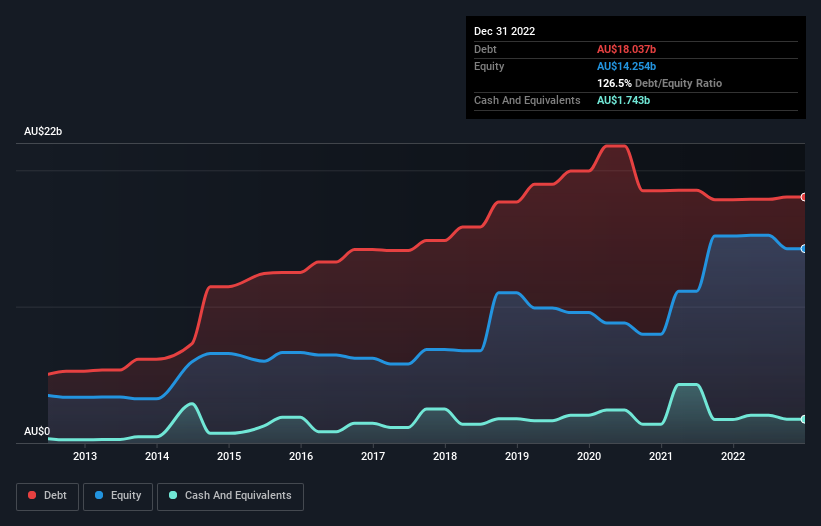
The external fund manager backed by Berkshire Hathaway's Charlie Munger, Li Lu, makes no bones about it when he says 'The biggest investment risk is not the volatility of prices, but whether you will suffer a permanent loss of capital.' It's only natural to consider a company's balance sheet when you examine how risky it is, since debt is often involved when a business collapses. Importantly, Transurban Group (ASX:TCL) does carry debt. But is this debt a concern to shareholders?
When Is Debt A Problem?
Debt assists a business until the business has trouble paying it off, either with new capital or with free cash flow. In the worst case scenario, a company can go bankrupt if it cannot pay its creditors. However, a more usual (but still expensive) situation is where a company must dilute shareholders at a cheap share price simply to get debt under control. Of course, the upside of debt is that it often represents cheap capital, especially when it replaces dilution in a company with the ability to reinvest at high rates of return. When we examine debt levels, we first consider both cash and debt levels, together.
Check out our latest analysis for Transurban Group
What Is Transurban Group's Net Debt?
The chart below, which you can click on for greater detail, shows that Transurban Group had AU$18.0b in debt in December 2022; about the same as the year before. However, because it has a cash reserve of AU$1.74b, its net debt is less, at about AU$16.3b.

How Healthy Is Transurban Group's Balance Sheet?
Zooming in on the latest balance sheet data, we can see that Transurban Group had liabilities of AU$4.17b due within 12 months and liabilities of AU$19.9b due beyond that. On the other hand, it had cash of AU$1.74b and AU$373.0m worth of receivables due within a year. So its liabilities total AU$21.9b more than the combination of its cash and short-term receivables.
Transurban Group has a very large market capitalization of AU$45.7b, so it could very likely raise cash to ameliorate its balance sheet, if the need arose. But we definitely want to keep our eyes open to indications that its debt is bringing too much risk.
We measure a company's debt load relative to its earnings power by looking at its net debt divided by its earnings before interest, tax, depreciation, and amortization (EBITDA) and by calculating how easily its earnings before interest and tax (EBIT) cover its interest expense (interest cover). Thus we consider debt relative to earnings both with and without depreciation and amortization expenses.
Transurban Group shareholders face the double whammy of a high net debt to EBITDA ratio (8.2), and fairly weak interest coverage, since EBIT is just 1.5 times the interest expense. This means we'd consider it to have a heavy debt load. The good news is that Transurban Group grew its EBIT a smooth 79% over the last twelve months. Like a mother's loving embrace of a newborn that sort of growth builds resilience, putting the company in a stronger position to manage its debt. When analysing debt levels, the balance sheet is the obvious place to start. But ultimately the future profitability of the business will decide if Transurban Group can strengthen its balance sheet over time. So if you're focused on the future you can check out this free report showing analyst profit forecasts.
Finally, a business needs free cash flow to pay off debt; accounting profits just don't cut it. So it's worth checking how much of that EBIT is backed by free cash flow. Over the last three years, Transurban Group reported free cash flow worth 11% of its EBIT, which is really quite low. For us, cash conversion that low sparks a little paranoia about is ability to extinguish debt.
Our View
Transurban Group's net debt to EBITDA and interest cover definitely weigh on it, in our esteem. But the good news is it seems to be able to grow its EBIT with ease. We should also note that Infrastructure industry companies like Transurban Group commonly do use debt without problems. When we consider all the factors discussed, it seems to us that Transurban Group is taking some risks with its use of debt. So while that leverage does boost returns on equity, we wouldn't really want to see it increase from here. When analysing debt levels, the balance sheet is the obvious place to start. But ultimately, every company can contain risks that exist outside of the balance sheet. We've identified 2 warning signs with Transurban Group , and understanding them should be part of your investment process.
When all is said and done, sometimes its easier to focus on companies that don't even need debt. Readers can access a list of growth stocks with zero net debt 100% free, right now.
Valuation is complex, but we're here to simplify it.
Discover if Transurban Group might be undervalued or overvalued with our detailed analysis, featuring fair value estimates, potential risks, dividends, insider trades, and its financial condition.
Access Free AnalysisHave feedback on this article? Concerned about the content? Get in touch with us directly. Alternatively, email editorial-team (at) simplywallst.com.
This article by Simply Wall St is general in nature. We provide commentary based on historical data and analyst forecasts only using an unbiased methodology and our articles are not intended to be financial advice. It does not constitute a recommendation to buy or sell any stock, and does not take account of your objectives, or your financial situation. We aim to bring you long-term focused analysis driven by fundamental data. Note that our analysis may not factor in the latest price-sensitive company announcements or qualitative material. Simply Wall St has no position in any stocks mentioned.
About ASX:TCL
Transurban Group
Engages in the development, operation, management, and maintenance of toll road networks.
Moderate growth potential low.
Similar Companies
Market Insights
Community Narratives





